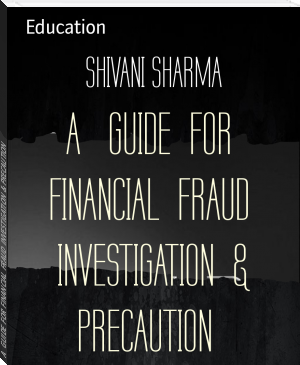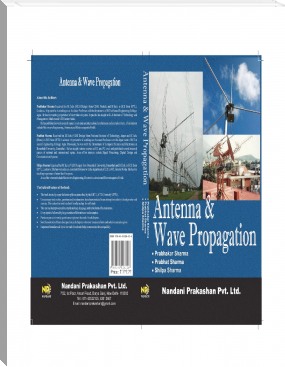A GUIDE FOR FINANCIAL FRAUD INVESTIGATION & PRECAUTION, SHIVANI SHARMA [read my book txt] 📗

- Author: SHIVANI SHARMA
Book online «A GUIDE FOR FINANCIAL FRAUD INVESTIGATION & PRECAUTION, SHIVANI SHARMA [read my book txt] 📗». Author SHIVANI SHARMA
In 2016, in the case of Salman v. United States, the U.S. Supreme Court held that the benefit a tipper must receive as predicate for an insider-trader prosecution of a tippee need not be pecuniary, and that giving a 'gift' of a tip to a family member is presumptively an act for the personal though intangible benefit of the tipper.[14]
By members of Congress[edit]
Members of the US Congress are exempt from the laws that ban insider trading. Because they generally do not have a confidential relationship with the source of the information they receive, however, they do not meet the usual definition of an "insider." [31] House of Representatives rules[32] may however consider congressional insider trading unethical. A 2004 study found that stock sales and purchases by Senators outperformed the market by 12.3% per year.[33] Peter Schweizer points out several examples of insider trading by members of Congress, including action taken by Spencer Bachus following a private, behind-the-doors meeting on the evening of September 18, 2008 when Hank Paulson and Ben Bernanke informed members of Congress about the imminent financial crisis, Bachus then shorted stocks the next morning and cashed in his profits within a week.[34] Also attending the same meeting were Senator Dick Durbin and John Boehner; the same day (trade effective the next day), Durbin sold mutual-fund shares worth $42,696, and reinvested it all with Warren Buffett. Also the same day (trade effective the next day), Congressman Boehner cashed out of an equity mutual fund.[35][36]
In May 2007, a bill entitled the "Stop Trading on Congressional Knowledge Act, or STOCK Act" was introduced that would hold congressional and federal employees liable for stock trades they made using information they gained through their jobs and also regulate analysts or "Political Intelligence" firms that research government activities.[37] The 2012 STOCK Act was passed on April 4, 2012.
With Congress-sourced information[edit]
In 2014, federal prosecutors issued a subpoena to the House Ways and Means committee and Brian Sutter, staff director of its health-care sub-committee, relative to a price move in stocks just prior to the passage of a law favorable to the companies involved. An e-mail was sent out by a "Washington-based policy-research firm that predicted the change [in the law] for its Wall Street clients. That alert, in turn, was based in part on information provided to the firm by a former congressional health-care aide turned lobbyist, according to emails reviewed by the [Wall Street] Journal" in 2013.[38]
Security analysis[edit]
Security analysts gather and compile information, talk to corporate officers and other insiders, and issue recommendations to traders. Thus their activities may easily cross legal lines if they are not especially careful. The CFA Institute in its code of ethics states that analysts should make every effort to make all reports available to all the broker's clients on a timely basis. Analysts should never report material nonpublic information, except in an effort to make that information available to the general public. Nevertheless, analysts' reports may contain a variety of information that is "pieced together" without violating insider trading laws, under the Mosaic theory.[39] This information may include non-material nonpublic information as well as material public information, which may increase in value when properly compiled and documented.
Arguments for legalizing[edit]
Some economists and legal scholars (such as Henry Manne, Milton Friedman, Thomas Sowell, Daniel Fischel, and Frank H. Easterbrook) have argued that laws against insider trading should be repealed. They claim that insider trading based on material nonpublic information benefits investors, in general, by more quickly introducing new information into the market.[40]
Friedman, laureate of the Nobel Memorial Prize in Economics, said: "You want more insider trading, not less. You want to give the people most likely to have knowledge about deficiencies of the company an incentive to make the public aware of that." Friedman did not believe that the trader should be required to make his trade known to the public, because the buying or selling pressure itself is information for the market.[9]:591–7
Other critics argue that insider trading is a victimless act: a willing buyer and a willing seller agree to trade property that the seller rightfully owns, with no prior contract (according to this view) having been made between the parties to refrain from trading if there is asymmetric information. The Atlantic has described the process as "arguably the closest thing that modern finance has to a victimless crime."[41]
Legalization advocates also question why "trading" where one party has more information than the other is legal in other markets, such as real estate, but not in the stock market. For example, if a geologist knows there is a high likelihood of the discovery of petroleumunder Farmer Smith's land, he may be entitled to make Smith an offer for the land, and buy it, without first telling Farmer Smith of the geological data.[citation needed]
Advocates of legalization make free speech arguments. Punishment for communicating about a development pertinent to the next day's stock price might seem an act of censorship.[42] If the information being conveyed is proprietary information and the corporate insider has contracted to not expose it, he has no more right to communicate it than he would to tell others about the company's confidential new product designs, formulas, or bank account passwords.
Some authors have used these arguments to propose legalizing insider trading on negative information (but not on positive information). Since negative information is often withheld from the market, trading on such information has a higher value for the market than trading on positive information.[43][44]
There are very limited laws against "insider trading" in the commodities markets if, for no other reason than that the concept of an "insider" is not immediately analogous to commodities themselves (corn, wheat, steel, etc.). However, analogous activities such as front running are illegal under US commodity and futures trading laws. For example, a commodity broker can be charged with fraud by receiving a large purchase order from a client (one likely to affect the price of that commodity) and then purchasing that commodity before executing the client's order to benefit from the anticipated price increase.
Commercialisation[edit]
The advent of the Internet has provided a forum for the commercialisation of trading on insider information. In 2016 a number of dark web sites were identified as marketplaces where such non-public information was bought and sold. At least one such site used bitcoins to avoid currency restrictions and to impede tracking. Such sites also provide a place for soliciting for corporate informants, where non-public information may be used for purposes[45] other than stock trading.[46]
Legal differences among jurisdictions[edit]
The US and the UK vary in the way the law is interpreted and applied with regard to insider trading. In the UK, the relevant laws are the Criminal Justice Act 1993, Part V, Schedule 1; the Financial Services and Markets Act 2000, which defines an offence of "Market Abuse";[47] and the European Union Regulation No 596/2014.[48][49] The principle is that it is illegal to trade on the basis of market-sensitive information that is not generally known. This is a much broader scope that under U.S. law. The key differences from U.S. law are that no relationship to either the issuer of the security or the tipster is required; all that is required is that the guilty party traded (or caused trading) whilst having inside information, and there is no scienter requirement under UK law.[6][50][51]
Japan enacted its first law against insider trading in 1988. Roderick Seeman said, "Even today many Japanese do not understand why this is illegal. Indeed, previously it was regarded as common sense to make a profit from your knowledge."[52]
In Malta the law follows the European broader scope model. The relevant statute is the Prevention of Financial Markets Abuse Act of 2005, as amended.[53][54] Earlier acts included the Financial Markets Abuse Act in 2002, and the Insider Dealing and Market Abuse Act of 1994.[55]
The International Organization of Securities Commissions (IOSCO) paper on the "Objectives and Principles of Securities Regulation" (updated to 2003)[56] states that the three objectives of good securities market regulation are:
Investor protection, Insuring that markets are fair, efficient and transparent, and Reducing systemic risk.The discussion of these "Core Principles" state that "investor protection" in this context means "Investors should be protected from misleading, manipulative or fraudulent practices, including insider trading, front running or trading ahead of customers and the misuse of client assets." More than 85 percent of the world's securities and commodities market regulators are members of IOSCO and have signed on to these Core Principles.
The World Bank and International Monetary Fund now use the IOSCO Core Principles in reviewing the financial health of different country's regulatory systems as part of these organization's financial sector assessment program, so laws against insider trading based on non-public information are now expected by the international community. Enforcement of insider trading laws varies widely from country to country, but the vast majority of jurisdictions now outlaw the practice, at least in principle.
Larry Harris claims that differences in the effectiveness with which countries restrict insider trading help to explain the differences in executive compensation among those countries. The US, for example, has much higher CEO salaries than do Japan or Germany, where insider trading is less effectively restrained.[9]:593
By nation[





Comments (0)